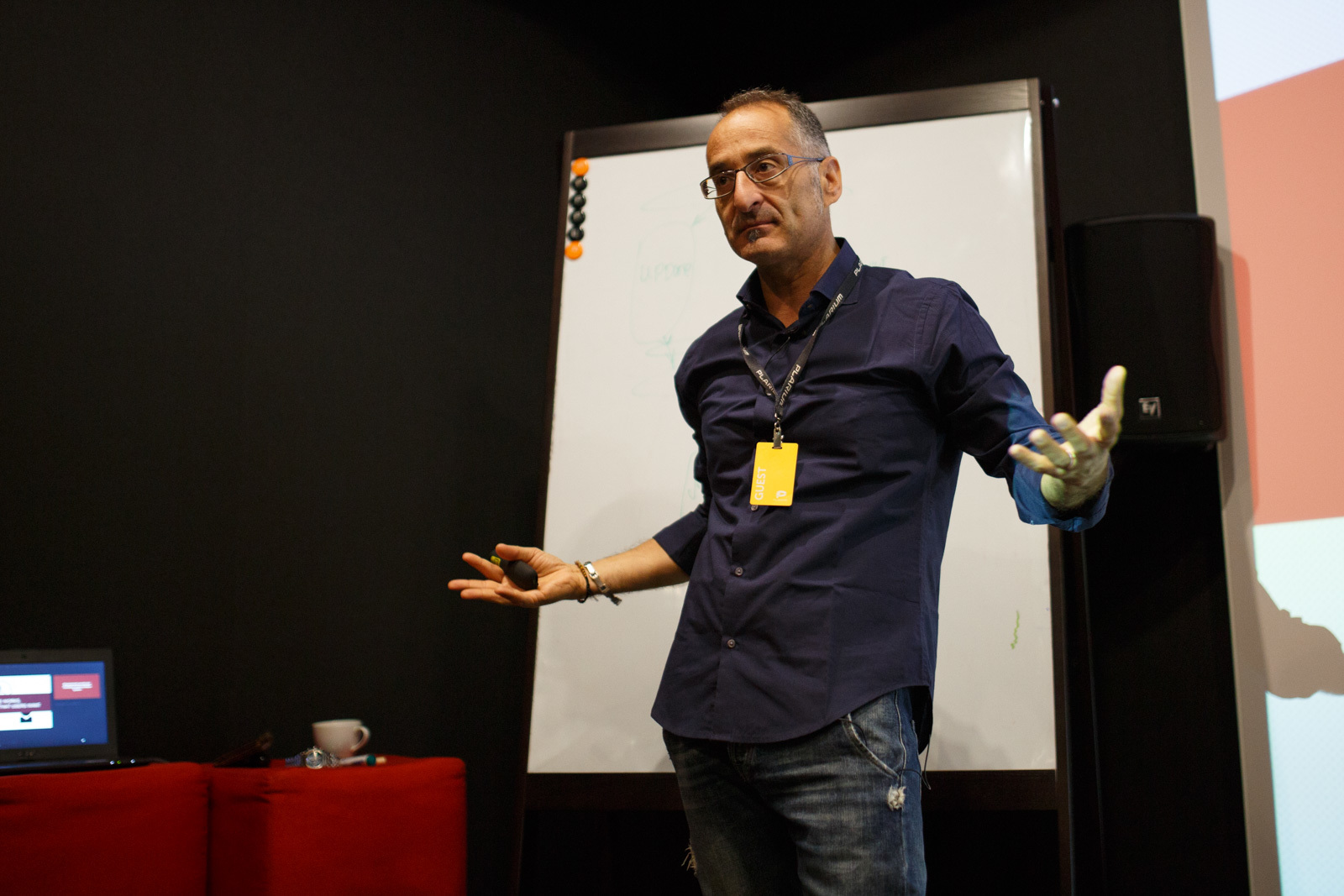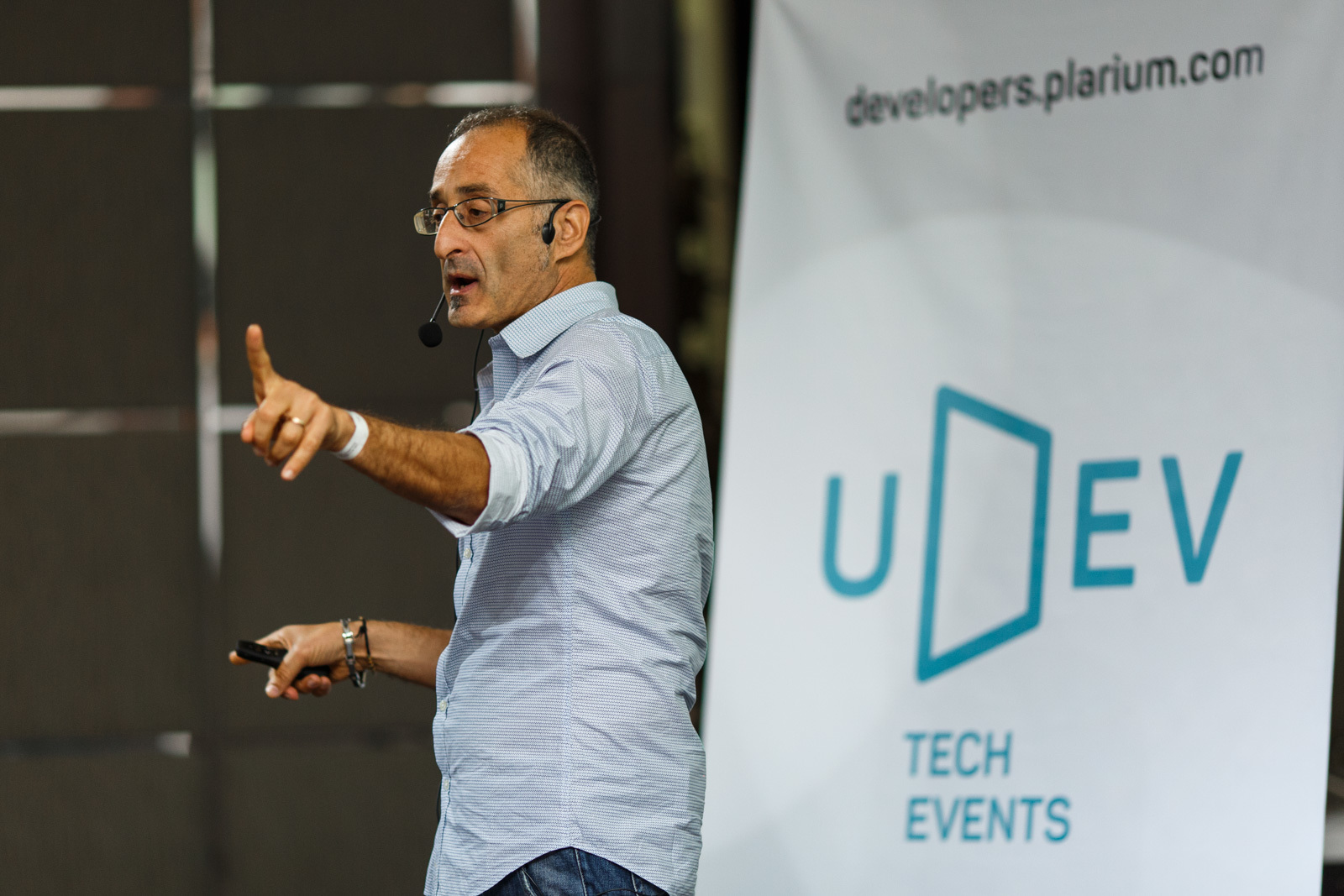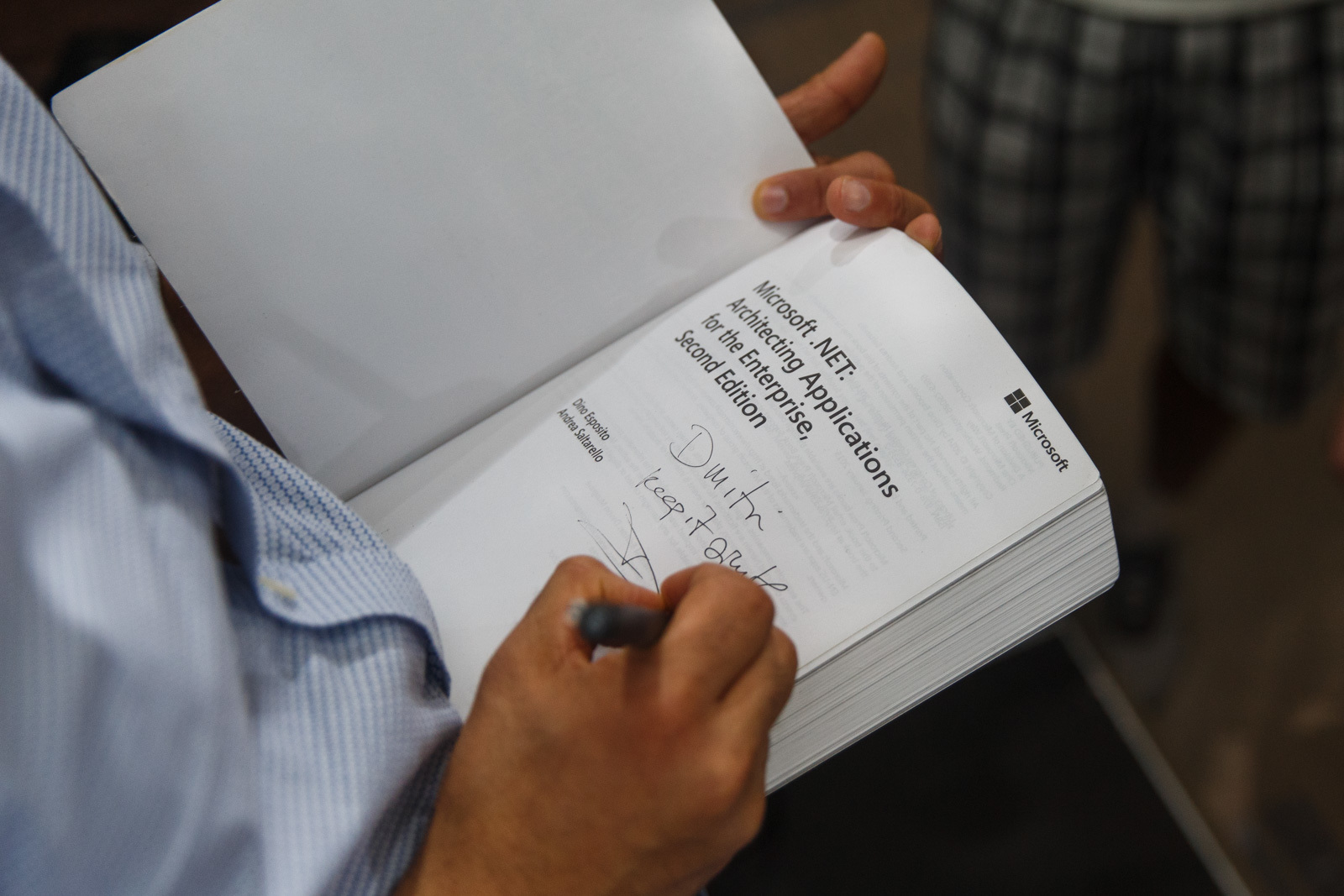Dino Esposito: "Here, developers are more in demand, and their work is paid higher"
On September 13, we held the fourth uDev for developers meeting, whose speaker was Dino Esposito , a .NET guru and an expert in mobile and web application development. How programmers live in Italy and whether our developers met Dino’s expectations, read our interview.

What did you know about the level of developers and the state of the market in Ukraine before you came to our country?
I knew that a significant part of Ukrainian developers are engaged in outsourcing. And although the cost of services is an important factor for customers, a serious company when searching for an outsourcer will not seek to save at any cost. Quality of work also plays an important role. In fact, outsourcing gets accustomed well where it can provide high quality at a lower price. However, I knew little about the education of programmers in Ukraine and about the quality of their work. But I always respected developers from Eastern Europe with great respect, because I know some of them.
')
Here, programmers are considered one of the most highly paid and sought-after specialists. Are things the same in Italy?
I think that in Ukraine, developers are more in demand, and their work is paid higher (given the local price level and cost of living). Few companies are engaged in serious development in Italy. We lack corporate development. Large companies, such as banks, pay huge amounts of money to consulting companies, which, in turn, hire programmers at a low price to earn more and pursue a more aggressive pricing policy with the end user. The quality of the product leaves much to be desired, but it seems that nobody cares. For developers, there is a great demand in small companies that are engaged in development, but there are very few such companies and they are unlikely to have a chance to overcome the threshold of 10–20 employees.

Work in a big company or create your own project - what do you think, what way should a developer go?
It all depends on the internal policy of a large company. If she is engaged in internal development and you are satisfied with this branch of business, then this is the optimal situation (as far as my professional world outlook suggests). If you don’t like the industry, work can be a nightmare. Working on your own projects is quite risky: you can get a good result, and you can just lose a lot of time. I would advise you to work in a company (better in large) and at the same time to do your own work.
How did you become a developer? What path does a specialist in your country go to become a professional?
My story is a little unusual, because I was lucky to be at the right time in the right place and, most importantly, with the right attitude and skills. Nevertheless, I saw how many people achieved remarkable results due to the fact that they worked more, tried harder to understand their field of activity, and were also able to explain in an easy way.

What makes a developer professional?
Someone once said that a professional is a person who has already made all the possible mistakes. In other words, professionalism comes with work experience and is supported by theoretical knowledge.
What are some books or resources that you find useful for developers?
It is difficult to find a universal answer. First of all, make sure that you have a basic understanding of the area in which you work, be it cloud computing, databases, the web or specific technologies. If you are a beginner, start working on something, then pause and take a closer look at this topic. In addition, few books can help you better than Stack Overflow, except for those that can take you to a fundamentally new level of understanding of things.
In IT, a lot of things change instantly. Should you chase trends and new technologies or should you use proven approaches?
If your methods work, continue to use them. Sooner or later, you still have to change something, and you will understand when this time will come. Some would say that this is an outdated view of things. But when things change quickly, it's best to remain practical.
What are your impressions of uDev meeting?
It was great: a lot of interesting people, a sea of enthusiasm. Such events should be longer and be held more often so that developers have more opportunities to share their experience. But for this it is not enough just to be a good specialist - you also need to be able to work with the public.

Were there any interesting or non-standard questions from the audience?
Yes, there were a few questions that prompted me to think that these guys are doing very difficult things. At the same time, if they are interested in the topic of the speech, it means that, like any professional, it is not enough just to deepen their knowledge in a certain area - you need to expand it. I would say that it is more important to expand the sphere of your competence, because, if necessary, you can always deepen your knowledge, and it takes years to expand your horizons.
Did the developer level meet your expectations?
My presentation was designed for a certain level of listeners. And I am sure that everyone understood the main ideas perfectly, most likely precisely because they are intelligent and susceptible to the new (which allows them to broaden their horizons), and not because they have solid technical knowledge. Remember my example about the breadth and depth of knowledge.
You had a few days to take a walk around Kharkov, you even managed to visit the tour. Tell us about your impressions of the trip to Ukraine?
Everything here seemed to me big and big. I saw a lot of wide areas, as well as roads, which take up as much space as the largest routes we have in Italy. But another great surprise for me was that one of my relatives came from the Kharkiv region, and her parents teach at a local university. After talking with her, I got an idea about this university and how important higher education is considered here. That is what inspired me to use the story of Karazin University to explain the concept of scalability during my presentation.
A video recording of Dino Esposito's speech at uDev with the report “Life as a Service: Scalability and other Aspects” is available at the link . The next uDev meeting will be held on October 25 in Kharkov, speaker - Director at R7K Research & Conveyance Michael Fezers.

What did you know about the level of developers and the state of the market in Ukraine before you came to our country?
I knew that a significant part of Ukrainian developers are engaged in outsourcing. And although the cost of services is an important factor for customers, a serious company when searching for an outsourcer will not seek to save at any cost. Quality of work also plays an important role. In fact, outsourcing gets accustomed well where it can provide high quality at a lower price. However, I knew little about the education of programmers in Ukraine and about the quality of their work. But I always respected developers from Eastern Europe with great respect, because I know some of them.
')
Here, programmers are considered one of the most highly paid and sought-after specialists. Are things the same in Italy?
I think that in Ukraine, developers are more in demand, and their work is paid higher (given the local price level and cost of living). Few companies are engaged in serious development in Italy. We lack corporate development. Large companies, such as banks, pay huge amounts of money to consulting companies, which, in turn, hire programmers at a low price to earn more and pursue a more aggressive pricing policy with the end user. The quality of the product leaves much to be desired, but it seems that nobody cares. For developers, there is a great demand in small companies that are engaged in development, but there are very few such companies and they are unlikely to have a chance to overcome the threshold of 10–20 employees.

Work in a big company or create your own project - what do you think, what way should a developer go?
It all depends on the internal policy of a large company. If she is engaged in internal development and you are satisfied with this branch of business, then this is the optimal situation (as far as my professional world outlook suggests). If you don’t like the industry, work can be a nightmare. Working on your own projects is quite risky: you can get a good result, and you can just lose a lot of time. I would advise you to work in a company (better in large) and at the same time to do your own work.
How did you become a developer? What path does a specialist in your country go to become a professional?
My story is a little unusual, because I was lucky to be at the right time in the right place and, most importantly, with the right attitude and skills. Nevertheless, I saw how many people achieved remarkable results due to the fact that they worked more, tried harder to understand their field of activity, and were also able to explain in an easy way.

What makes a developer professional?
Someone once said that a professional is a person who has already made all the possible mistakes. In other words, professionalism comes with work experience and is supported by theoretical knowledge.
What are some books or resources that you find useful for developers?
It is difficult to find a universal answer. First of all, make sure that you have a basic understanding of the area in which you work, be it cloud computing, databases, the web or specific technologies. If you are a beginner, start working on something, then pause and take a closer look at this topic. In addition, few books can help you better than Stack Overflow, except for those that can take you to a fundamentally new level of understanding of things.
In IT, a lot of things change instantly. Should you chase trends and new technologies or should you use proven approaches?
If your methods work, continue to use them. Sooner or later, you still have to change something, and you will understand when this time will come. Some would say that this is an outdated view of things. But when things change quickly, it's best to remain practical.
What are your impressions of uDev meeting?
It was great: a lot of interesting people, a sea of enthusiasm. Such events should be longer and be held more often so that developers have more opportunities to share their experience. But for this it is not enough just to be a good specialist - you also need to be able to work with the public.

Were there any interesting or non-standard questions from the audience?
Yes, there were a few questions that prompted me to think that these guys are doing very difficult things. At the same time, if they are interested in the topic of the speech, it means that, like any professional, it is not enough just to deepen their knowledge in a certain area - you need to expand it. I would say that it is more important to expand the sphere of your competence, because, if necessary, you can always deepen your knowledge, and it takes years to expand your horizons.
Did the developer level meet your expectations?
My presentation was designed for a certain level of listeners. And I am sure that everyone understood the main ideas perfectly, most likely precisely because they are intelligent and susceptible to the new (which allows them to broaden their horizons), and not because they have solid technical knowledge. Remember my example about the breadth and depth of knowledge.
You had a few days to take a walk around Kharkov, you even managed to visit the tour. Tell us about your impressions of the trip to Ukraine?
Everything here seemed to me big and big. I saw a lot of wide areas, as well as roads, which take up as much space as the largest routes we have in Italy. But another great surprise for me was that one of my relatives came from the Kharkiv region, and her parents teach at a local university. After talking with her, I got an idea about this university and how important higher education is considered here. That is what inspired me to use the story of Karazin University to explain the concept of scalability during my presentation.
A video recording of Dino Esposito's speech at uDev with the report “Life as a Service: Scalability and other Aspects” is available at the link . The next uDev meeting will be held on October 25 in Kharkov, speaker - Director at R7K Research & Conveyance Michael Fezers.
Source: https://habr.com/ru/post/311308/
All Articles